ESTRAGON
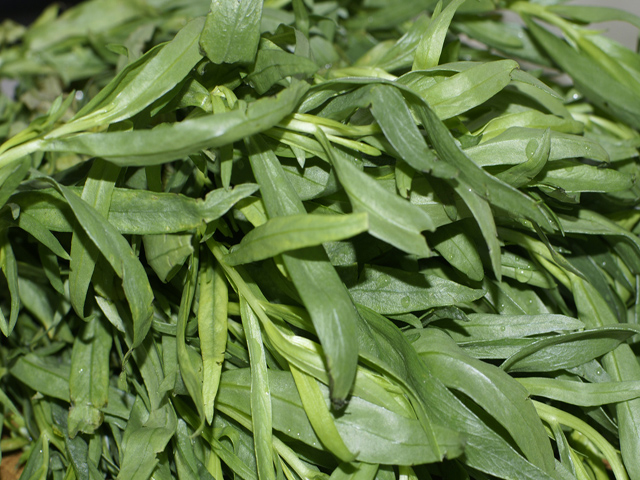
Nutritional Information and Properties
Herbs such as tarragon are used for cooking but generally in too small quantities to make a significant nutritional contribution. That said, tarragon is still an excellent source of manganese, iron, magnesium, calcium, and potassium. Tarragon also contains vitamins C and A and some traces of zinc, phosphorus, and copper. Tarragon is rich in folates, antioxidants, as well as several health-promoting essential oils such as cineol, ocimene and estragole. It is also full of phytonutrients that are responsible for improving health. To top it all off, one teaspoon of tarragon leaves has only two calories.
Health Benefits and Therapeutic Uses:- The polyphenolic compounds present in estragon are responsible for lowering blood sugar levels naturally.
- Eating estragon regularly can prevent platelet adhesion and aggregation. This reduces the risk of clot formation, heart attack and strokes.
- Estragon is an appetite stimulant and can be used to treat anorexia and other eating disorders.
- It can cure hiccups, flatulence and stomach cramps.
- Eugenol, an essential oil found in estragon is used for its antiseptic and anesthetic properties in dentistry and to treat toothaches. Chewing some dried or fresh estragon leaves can numb a painful tooth as well.
- Drinking a cup of estragon tea before bed can cure insomnia.
- Estragon was used in the Middle Ages to treat snakebites.
- Estragon can be substituted for salt in case you suffer from hypertension. This also helps reduce obesity.
- It improves digestion and the functioning of the liver and speeds up the process of waste elimination in the body. It also increases the production of bile in the liver and aids the digestion process.
- Estragon is an effective cure for intestinal worms. Drink at least four cups of estragon tea a day for the best results.
- If your period is delayed, estragon can induce menstruation in some cases. It also helps regulate your menstrual cycle when taking regularly.
- Estragon tea has a calming influence on the nervous system and can reduce anxiety and tension.
- Estragon is often used to treat muscle and joint pain caused by rheumatism or arthritis.
- Estragon and fennel taken together can treat depression.
- Estragon is a natural diuretic and reduces water retention.
- Russian estragon is believed to help build muscles as it increases absorption of creatine. Research is still being conducted in this area and as of yet no conclusive evidence has been reached.
- Being rich in vitamin A and potassium, regular consumption of estragon improves eye health.
- The antibacterial properties of estragon lend it to being used as a natural deodorant. It prevents bad body odor and reduces the growth of microbes on the skin. Estragon is often used as an ingredient in commercially prepared deodorants as well.
- Estragon acts as a stimulant for the circulatory, digestive, nervous, and endocrinal systems. It improves overall health and builds immunity.
- Estragon essential oil fights bad breath.
Even though estragon is non-toxic and can be eaten safely, care should be taken that the dosages do not exceed the recommendations of your health care provider or herbal practitioner. Pregnant women should avoid estragon essential oil.
PEACH
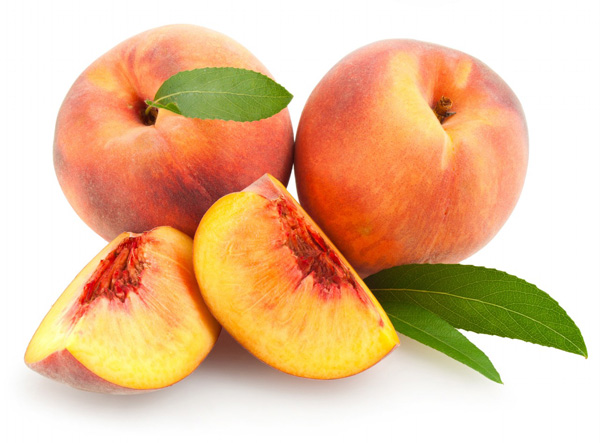
Peaches have been grown for centuries. They were first cultivated in China where they are considered a symbol of immortality and friendship. I consider them a key powerfood along with staples like apples and pears. I just wish they were available longer!
16 Ways Peaches Fortify Your Health
1. Peaches are the perfect snack food for losing weight. A peach makes you feel full and keeps you from overeating. The bonus: one peach only contains about 35-50 calories and no fat!
2. Fight obesity-related diabetes and cardiovascular disease. Peaches are rich in phytochemicals called phenols that act as antioxidants.
3. Keep the skin healthy. Vitamin A and C make peaches a great natural moisturizer; they’re often used in cosmetics. These vitamins can help regenerate skin tissue.
4. Reduce hair loss with its positive effect on the scalp.
5. A healthy stress-reliever that helps reduce anxiety. Peaches are often referred to as the ‘Fruit of Calmness’ in Hungary.Peaches have been grown for centuries. They were first cultivated in China where they are considered a symbol of immortality and friendship.Peaches have been grown for centuries. They were first cultivated in China where they are considered a symbol of immortality and friendship.
6. Helps prevent cancer with selenium — a mineral with antioxidant properties that may help protect cells from damage.
7. Peaches can help remove worms from the intestines.
8. Have a diuretic effect which helps cleanse your kidneys and bladder.
9. Peaches can calm an upset stomach.
10. Compounds in stone fruits could help with "metabolic syndrome," according to Dr. Luis Cisneros-Zevallos, AgriLife Research food scientist involved in a study at the American Chemical Society in Philadelphia. Cisneros-Zevallos says, “Our work indicates that phenolic compounds present in these fruits have anti-obesity, anti-inflammatory and anti-diabetic properties in different cell lines and may also reduce the oxidation of bad LDL cholesterol which is associated with cardiovascular disease."
11. Those suffering from gout and rheumatism are recommended by dieticians to eat peaches because peaches tend to have a diuretic and a light laxative effect.
12. Peaches are thought to be an aphrodisiac.
13. Peach flowers have sedative properties. A remedy for restlessness includes boiling peach flowers in water along with some honey.
14. Inhibit tumour growth activity. Peaches have excellent antimicrobial and antioxidant activity according to research.
15. Chronic bronchitis, coughs and gastritis are relieved with the medicinal tea of the leaves and bark of peach trees.
16. Peach tea is used as a kidney cleanser in China.
"Life is better than death, I believe, if only because it is less boring, and because it has fresh peaches in it." ― Alice WalkerMULBERRY
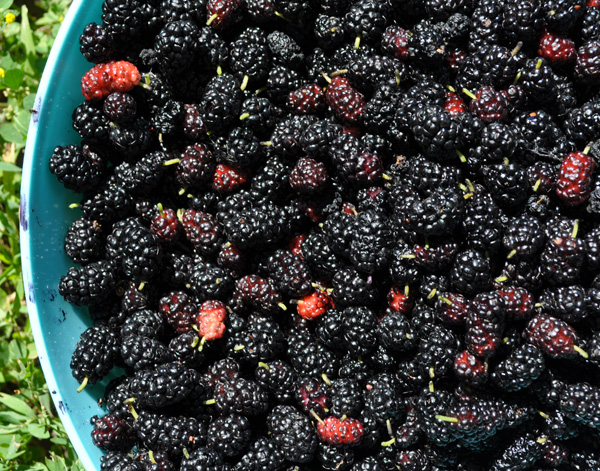
Mulberries are delicious and nutritious, people all over the world enjoy it. Mulberries are a product of the Morus alba tree. Its leaves, which also contain nutrients and are even used as food for silkworms, are thin, glossy and light green; the fruit, like grapes, is red or white and grows in bunches called "drupes."
Health benefits of mulberries:- Delicious, fleshy, succulent mulberries are less in calories (just 43 calories per 100 g). They compose of health promoting phyto-nutrient compounds like polyphenol pigment antioxidants, minerals, and vitamins that are essential for optimum health.
- Mulberries have significantly high amounts of phenolic flavonoid phytochemicals called anthocyanins. Scientific studies have shown that consumption of berries have potential health effects against cancer, aging and neurological diseases, inflammation, diabetes, and bacterial infections.
- The berries contain resveratrol, another polyphenol flavonoid antioxidant. Resveratrol protects against stroke risk by altering molecular mechanisms in the blood vessels; reducing their susceptibility to damage through reduced activity of angiotensin (a systemic hormone causing blood vessel constriction that would elevate blood pressure) but potentiating production of the vasodilator hormone, nitric oxide.
- In addition, these berries are an excellent sources of vitamin-C (36.4 mg per 100, about 61% of RDI), which is also a powerful natural antioxidant. Consumption of foods rich in vitamin-C helps the body develop resistance against infectious agents, counter inflammation and scavenge harmful free radicals.
- Further, the berries also contain small amounts of vitamin A, and vitamin E, in addition to the above-mentioned antioxidants. Consumption of mulberry provides another group of health promoting flavonoid polyphenolic antioxidants such as lutein, zea-xanthin, ß-carotene and a-carotene in small but notably significant amounts. Altogether, these compounds help act as protect from harmful effects of oxygen-derived free radicals and reactive oxygen species (ROS) that play a role in aging and various disease processes.
- Zea-xanthin, an important dietary carotenoid selectively concentrates into the retinal macula lutea, where it thought to provide antioxidant functions and protects the retina from the harmful ultraviolet rays through light-filtering actions.
- Mulberries are an excellent source of iron, which is a rare feature among berries, contain 1.85 mg/100 g of fruits (about 23% of RDI). Iron, being a component of hemoglobin inside the red blood cells, determines the oxygen-carrying capacity of the blood.
- They also good source of minerals like potassium, manganese, and magnesium. Potassium is an important component of cell and body fluids that helps controlling heart rate and blood pressure. Manganese is used by the body as a co-factor for the antioxidant enzyme, superoxide dismutase.
- They are rich in B-complex group of vitamins and vitamin K. Contain very good amounts of vitamin B-6, niacin, riboflavin and folic acid. These vitamins are function as co-factors and help body in the metabolism of carbohydrates, protein, and fats.
APPLE

An apple a day keeps the doctor away" is an old Welsh proverb that most of us are familiar with, but what makes this fruit so special?
An apple a day keeps the doctor away" is an old Welsh proverb that most of us are familiar with, but what makes this fruit so special? What health benefits are associated with eating apples? Antioxidants are disease-fighting compounds. Scientists believe these compounds help prevent and repair oxidation damage that happens during normal cell activity. Apples are also full of a fibre called pectin’a medium-sized apple contains about 4 grams of fibre. Pectin is classed as a soluble, fermentable and viscous fibre, a combination that gives it a huge list of health benefits.
1. Get whiter, healthier teeth
An apple won’t replace your toothbrush, but biting and chewing an apple stimulates the production of saliva in your mouth, reducing tooth decay by lowering the levels of bacteria.
2. Avoid Alzheimer’s
A new study performed on mice shows that drinking apple juice could keep Alzheimer’s away and fight the effects of aging on the brain. Mice in the study that were fed an apple-enhanced diet showed higher levels of the neurotransmitter acetylcholine and did better in maze tests than those on a regular diet.
3. Protect against Parkinson’s Research has shown that people who eat fruits and other high-fibre foods gain a certain amount of protection against Parkinson’s, a disease characterized by a breakdown of the brain’s dopamine-producing nerve cells. Scientists have linked this to the free radical-fighting power of the antioxidants contained therein.
4. Curb all sorts of cancers
Scientists from the American Association for Cancer Research, among others, agree that the consumption of flavonol-rich apples could help reduce your risk of developing pancreatic cancer by up to 23 per cent. Researchers at Cornell University have identified several compounds’triterpenoids’in apple peel that have potent anti-growth activities against cancer cells in the liver, colon and breast. Their earlier research found that extracts from whole apples can reduce the number and size of mammary tumours in rats. Meanwhile, the National Cancer Institute in the U.S. has recommended a high fibre intake to reduce the risk of colorectal cancer.
5. Decrease your risk of diabetes
Women who eat at least one apple a day are 28 percent less likely to develop type 2 diabetes than those who don’t eat apples. Apples are loaded with soluble fibre, the key to blunting blood sugar swings.
6. Reduce cholesterol
The soluble fibre found in apples binds with fats in the intestine, which translates into lower cholesterol levels and a healthier you.
7. Get a healthier heart
An extensive body of research has linked high soluble fibre intake with a slower buildup of cholesterol-rich plaque in your arteries. The phenolic compound found in apple skins also prevents the cholesterol that gets into your system from solidifying on your artery walls. When plaque builds inside your arteries, it reduces blood flow to your heart, leading to coronary artery disease.
8. Prevent gallstones
Gallstones form when there’s too much cholesterol in your bile for it to remain as a liquid, so it solidifies. They are particularly prevalent in the obese. To prevent gallstones, doctors recommend a diet high in fibre to help you control your weight and cholesterol levels.
9.Beat diarrhea and constipation
Whether you can’t go to the bathroom or you just can’t stop, fibre found in apples can help. Fibre can either pull water out of your colon to keep things moving along when you’re backed up, or absorb excess water from your stool to slow your bowels down.
10. Neutralize irritable bowel syndrome
Irritable bowel syndrome is characterized by constipation, diarrhea, and abdominal pain and bloating. To control these symptoms doctors recommend staying away from dairy and fatty foods while including a high intake of fibre in your diet.
11. Avert hemorrhoids
Hemorrhoids are a swollen vein in the anal canal and while not life threatening, these veins can be very painful. They are caused by too much pressure in the pelvic and rectal areas. Part and parcel with controlling constipation, fibre can prevent you from straining too much when going to the bathroom and thereby help alleviate hemorrhoids.
12. Control your weight
Many health problems are associated with being overweight, among them heart disease, stroke, high blood pressure, type 2 diabetes and sleep apnea. To manage your weight and improve your overall health, doctors recommend a diet rich in fibre. Foods high in fibre will fill you up without costing you too many calories.
13. Detoxify your liver
We’re constantly consuming toxins, whether it is from drinks or food, and your liver is responsible for clearing these toxins out of your body. Many doctors are skeptical of fad detox diets, saying they have the potential to do more harm than good. Luckily, one of the best’and easiest’things you can eat to help detoxify your liver is fruits’like apples.
14. Boost your immune system
Red apples contain an antioxidant called quercetin. Recent studies have found that quercetin can help boost and fortify your immune system, especially when you’re stressed out.
15. Prevent cataracts
Though past studies have been divided on the issue, recent long-term studies suggest that people who have a diet rich in fruits that contain antioxidants’like apples’are 10 to 15 per cent less likely to develop cataracts.
APRICOT
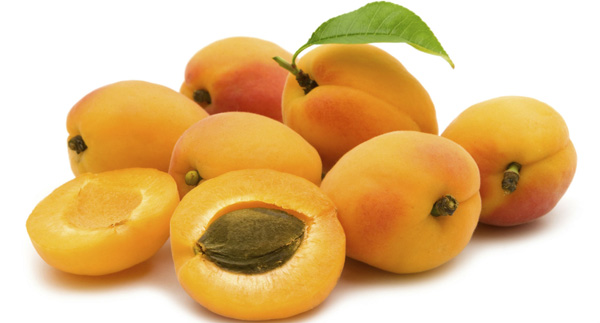
Health Benefits
Apricots are rich in many plant antioxidants. Some of these are the vitamin antioxidants so familiar to regular users of this site. Others are more difficult to obtain from other foods, and may be responsible for specific health benefits. Overall, consider the apricot to be a great food that provides you with the protective effects of antioxidants while adding very few calories to your daily total.
Protection Against Free Radical Damage
Apricots contain a number of potent antioxidants. We rank the apricot as a good source of both vitamin A (from beta-carotene) and vitamin C. The health benefits associated with each are multiple and well-documented.
Apricots are rich in other antioxidants, too, including polyphenolic antioxidants like flavonoids. Diets rich in flavonoids and the other types of polyphenols found in apricots have been linked to reductions in heart disease in humans, as well as other potential health benefits.
Antioxidants are responsible for some of the specific effects listed below, but those only scratch the surface of the potential health benefits of diets rich in these important nutrients. Here are a few of the important antioxidant nutrients or nutrient groups found in apricots:
- Quercetin
- Proanthocyanidins
- Catechins
- Epicatechins
- Hydroxycinnamics
- Gallic acid
- Caffeic acid
- Coumaric acid
- Ferulic acid.
Protect Your Eyesight
Apricots are rich in the carotenoids and xanthophylls, nutrients that researchers believe may help protect eyesight from aging-related damage To give an example of how this works, one of these nutrients (lutein) appears to be able to protect the retina—the part of the eye that picks up the visual image from the environment—from damage caused by blue light.
Additionally, researchers have linked regular intake of fruit with less risk of vision loss with aging. This benefit is found in people who eat three or more servings of fruit each day.
Three servings of fruit may sound like a lot to eat each day, but by simply snacking on an apricot, tossing a banana into your morning smoothie, and topping off a cup of yogurt or green salad with one-half cup of berries, you've reached this goal.
Protect Against Inflammation
Apricots are a strong dietary source of catechins, a broad family of flavonoid phytonutrients (you may be familiar with these phytonutrients since they are often cited for the benefits provided by green tea). A single apricot will provide you with 4-5 grams from catechins. These phytonutrients are potent anti-inflammatory nutrients and researchers have looked extensively at their health effects. Researchers have discovered that catechins can inhibit the activity of an enzyme called cyclooxygenase-2 (COX-2), one of the critical steps in the process of inflammation.
Much of this research on catechin benefits involves animal rather than human studies. But we have seen human research where diets rich in catechins—not specifically from apricots but from other catechin-rich foods like tea or cocoa—have led to significant beneficial changes. For instance, multiple studies have shown that catechin-rich foods can protect blood vessels from inflammation-related damage, leading to better blood pressure control.
Other Health Benefits
Apricots are a good source of dietary fiber. This overall fiber content should be helpful for most people in supporting digestive health. Within the total dietary fiber provided by apricots, about half consists of soluble fiber. Soluble fiber is one type of fiber that can help to control blood cholesterol levels.
LEMON
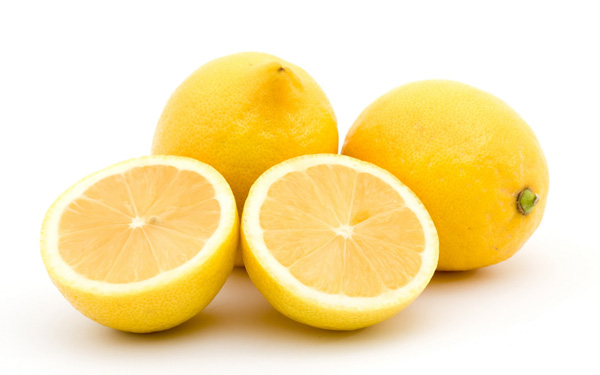
The health benefits of lemons are due to its many nourishing elements like vitamin C, vitamin B6, vitamin A, vitamin E, folate, niacin thiamin, riboflavin, pantothenic acid, copper, calcium, iron, magnesium, potassium, zinc, phosphorus and protein. Lemon is a fruit that contains flavonoids, which are composites that contain antioxidant and cancer fighting properties. It helps to prevent diabetes, constipation, high blood pressure, fever, indigestion and many other problems, as well as improving the skin, hair, and teeth. Studies conducted at the American Urological Association highlight the fact that lemonade or lemon juice can eliminate the occurrence of kidney stones by forming urinary citrate, which prevents the formation of crystals.
People use lemons to make lemonade by mixing lemon juice and water. Many people also use lemon as a washing agent, because of its ability to remove stains. The scent of lemon can also repel mosquitoes, while drinking lemon juice with olive oil helps to get rid of gall stones. Lemon is well known for its medicinal power and is used in many different ways. As per the results reported in a study by the Annals of the Rheumatic Diseases, lemon provides protection against inflammatory polyarthritis and arthritis.
Health Benefits of Lemon
Various health benefits of lemon are explained below:
Indigestion and Constipation: Lemon juice helps to cure problems related to indigestion and constipation. Add a few drops of lemon on your dish (take care, it does not go well with milk), and it will aid in digestion. It acts as a blood purifier and a cleansing agent, so a good drink after lunch or dinner is fresh lemon soda, which is also called fresh lime soda in many places. The recipe is lemon juice, cold water, soda, salts (common salt or rock salt) and sugar/honey for sweetness. You can also add some mint leaves or crushed fennel seeds for added flavor. Drink this whenever you have a heavy lunch or dinner.
Fever: Lemon juice can treat a person who is suffering from a cold, flu or fever. It helps to break fevers by increasing perspiration.
Dental Care: It is also frequently used in dental care. If fresh lemon juice is applied on the area of a toothache, it can assist in getting rid of the pain. Massaging the juice on the gums can stop gum bleeding, while eliminating the bad odors that can come from various gum diseases and conditions.
Additionally, it can be used in the regular cleansing of your teeth. Keep your eye out for a toothpaste containing lemon as one of the ingredients, or add a drop of its juice onto your normal toothpaste. Some people also rub their teeth with the outer shell (the inner side touching your teeth) of a lemon after removing the juice. But be careful, lemons are highly acidic, so if your mouth starts burning, rinse your gums and mouth quickly with water.
Hair Care: Lemon juice has proven itself in the treatment of hair care on a wide scale. The juice applied to the scalp can treat problems like dandruff, hair loss and other problems related to the hair and scalp. If you apply lemon juice directly on the hair, it can give your hair a natural shine.
Skin Care: Lemon juice, being a natural antiseptic medicine, can also cure problems related to the skin. The juice can be applied to reduce the pain of sun burn, and it helps to ease the pain from bee stings as well. It is also good for acne and eczema. It acts as an anti-aging remedy and can remove wrinkles and blackheads. Drinking lemon juice mixed with water and honey brings a healthy glow to the skin, and if you thoroughly search the cosmetic market, you will find some soaps containing lemon juice, but they aren’t too easy to find!
Burns: Use lemon juice on the site of old burns can help fade the scars, and since lemon is a cooling agent, it reduces the burning sensation on the skin when you currently have an irritating burn.
Internal Bleeding: It has antiseptic and coagulant properties, so it can stop internal bleeding. You can apply lemon juice to a small cotton ball and place it inside your nose to stop nose bleeds.
QUINCE

Health Benefits Of Quince Fruit:
Like most fruits, quince is rich in nutrients like Vitamins A, B and C, fiber, as well as minerals like potassium, copper, selenium, zinc, phosphorus, calcium, iron, and magnesium. It is low in fat. The rich nutritional value of quince makes it beneficial for your health in the following ways:
1. Anti-inflammatory Properties:Ripe quince fruit is a rich source of Vitamin C, contributing nearly 25% of the recommended daily allowance (RDA). Vitamin C helps to boost immunity and aids in the treatment of inflammatory conditions. It also possesses anti-allergenic properties. The fruit and its seed extract can be used to treat atopic dermatitis and cystitis. It can also be used in the preparation of food products for allergy sufferers.
2. Good For Weight Loss:Quince fruit is low in calories but high in dietary fiber. A 100 gram serving of fresh raw quince fruit contains just 57 calories. It is also low in saturated fat, sodium and cholesterol. All these qualities make it an amazing choice for weight loss and overall health. 3. Treats Ulcers:
The phenolics present in Chinese quince have been found to be effective in relieving gastric ulcers. Quince juice is also beneficial for people suffering from gastric ulcers. It also helps in the treatment of peptic ulcers as it soothes the gastrointestinal tract.
4. Treats Stomach Ailments:Quince is an effective remedy for morning sickness. Quince, when mixed with honey, can help treat colitis, diarrhea, constipation, and intestinal infections. Quince syrup is used to treat hemorrhoids.
5. Antioxidant Benefits:This fruit boasts of amazing antioxidant properties due to the presence of poly-phenolic compounds. These antioxidants fight off the free radicals present in the body, slowing down the aging process as well as preventing cardiovascular diseases and strokes.
6. Treats Nausea And Vomiting:Boiled or baked quince relieves nausea and vomiting. Being a good diuretic, it helps to remove fluid build up.
7. Antiviral Properties:Research has shown that quince fruit is rich in anti-viral properties. The phenolics found in Chinese quince possess strong anti-influenza activity as well as antioxidant properties. It helps protect against colds, flues and other viral pathogens.
8. Lowers Blood Pressure:Being rich in potassium, quince fruit helps keep high blood pressure in check.
9. Lowers Cholesterol Levels:Regular consumption of quince fruit helps to lower LDL or bad cholesterol in the blood, keeping the heart healthy.
10. Anticancer Properties:The antioxidant properties of quince help the body fight against free radicals and destroy malignant cancer cells. The granules in the pulp of quince fruit contain astringent compounds known as tannins i.e. catechin and epicatechin. These tannins protect your mucous membranes from cancers by binding to cancer-causing toxins and chemicals in the colon.
11. Relieves Stress:The various antioxidants in quince help in relieving stress and maintaining a calm mind.
12. Treats Liver And Eye Diseases:Regular consumption of quince is beneficial for those suffering from liver and eye diseases. In China, the soaked and boiled seeds of quince are used to prepare a jelly, which can soothe eye problems, sore throats and inflammation of the mucous membranes.
14. Benefits Of Quince Seeds And Oil:Quince seeds are effective in curing hoarseness of the throat and trachea as well as other ailments. Its oil prevents sweating, fortifies the heart and strengthens the liver and stomach.
15. Other Benefits:Quince juice is helpful in the treatment of cardiovascular diseases, respiratory ailments, anemia, and asthma. Regular consumption can help in the treatment of tuberculosis, dysentery and hepatic insufficiency too.
PEAR
5 Health Benefits of Pears

Soft and sweet, pears are a treat in themselves. Once called the “gift of the gods” by Homer, author of the Odyessy, pears are packed with nutrients, fiber and antioxidants, making them a delicious but healthful snacking choice. Check out these five health benefits of pears for more good reasons to indulge in this sweet fruit.
Health Benefits of Pears
Fight Free Radicals
Pears are naturally high in vitamins C and K, as well as nutrients such as copper—all of which act as antioxidants to protect our cells from damage from free radicals. One pear contains up to 11 percent of our daily recommended intake of vitamin C and 9.5 percent of our daily recommended intake of copper. Pears are also said to have more nutrients per calorie than calorie per nutrient.
Protect Our Hearts
Pears are an excellent source of dietary fiber, and fiber is good for the heart. Studies have shown that fiber can lower levels of bad cholesterol by binding to bile salts—which are made from cholesterol—and carrying them out of the body. Eating pears can also reduce risk of stroke by up to 50 percent.
Cancer Prevention
Pears can also protect us from varying types of cancer. In addition to binding to cholesterol, the fiber in pears can also bind to and help remove cancer-causing chemicals in the colon, thus reducing risk of colon cancer. Studies have also shown that eating fiber-rich fruits such as pears can reduce risk of break cancer by 34 percent in post-menopausal women.
Hypoallergenic Fruit
Although few studies have been done on the subject, doctors generally consider pears to be a hypoallergenic fruit because they are less likely than other fruits to produce an allergic response when eaten. For this reason, pears are generally considered “safe” and are often one of the first fruits given to infants.
Control Diabetes
Because they are high in fiber and have a low glycemic index, pears make a smart snack for those with diabetes. The bloodstream slowly absorbs a pear’s carbs (just about 26 grams per pear), preventing a spike in blood sugar and helping to control blood glucose levels. Lightly sweet, pears can also satisfy the sweet tooth in a healthier way than other sweets.
Eating Pears
The typical pear season runs from August to October, but with so many varieties of pear, you’re likely to find some variety in season where you are. Pears ripen from the inside out, so to tell if your pear is ready to eat or not, check the neck (skinniest part of the pear) by applying gentle pressure. Along with apples, pears are part of the rose family, and like apples, many of the health benefits of pears can be found in the fruit’s skin—meaning for maximum health benefits, eat pears with the skin left on.